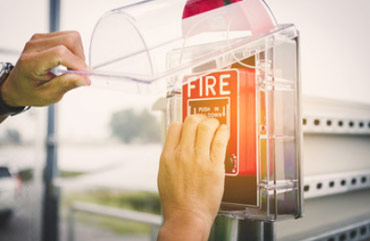The Importance of Regular Fire Alarm System Inspections in Houston, Texas
When was the last time you thought about your fire alarm system? In the vibrant city of Houston, ensuring that your fire alarm is running smoothly isn't just a good idea; it's essential for protecting your home or business. Regular inspections can catch potential issues before they become costly problems, all while providing peace of mind for you and your loved ones. Here are some key reasons why regular fire alarm system inspections are essential:

- Compliance with Regulations: Texas, like other states, has strict regulations and codes governing fire alarm systems. Building owners and operators must adhere to these regulations to meet legal requirements. Failure to comply can result in fines, legal liabilities, and even the closure of non-compliant facilities.
- National Fire Protection Association (NFPA) Standards: NFPA 72, the National Fire Alarm and Signaling Code, is widely recognized and adopted in Texas. It provides comprehensive guidelines for the design, installation, testing, inspection, and maintenance of fire alarm systems. Regular inspections ensure compliance with NFPA 72 and help maintain system effectiveness.
- Life Safety: The primary purpose of a fire alarm system is to protect lives. Timely inspections help ensure that the system is in optimal working condition, increasing the chances of early fire detection and evacuation, which are critical for saving lives.
- Property Protection: Beyond life safety, fire alarm systems also safeguard property by detecting fires in their early stages. This early detection can prevent extensive damage and loss of valuable assets.
- Liability Mitigation: In the event of a fire-related incident, liability issues may arise. Regular inspections and maintenance demonstrate due diligence in maintaining a safe environment, which can help mitigate potential legal repercussions.
- Minimizing False Alarms: False alarms can be disruptive and costly. Routine inspections can help reduce false alarms caused by malfunctioning components or outdated technology, minimizing unnecessary responses from fire departments.
- Insurance Requirements: Insurance policies often require that fire alarm systems be regularly inspected and maintained to ensure eligibility for coverage. Non-compliance with inspection requirements may result in reduced insurance coverage or increased premiums.
- Cost Savings: Regular inspections can help identify and address issues before they escalate into costly problems. Preventative maintenance is typically more cost-effective than emergency repairs or system replacements.
- Peace of Mind: Building occupants and owners gain peace of mind knowing that their fire alarm system is regularly inspected and well-maintained, instilling confidence that it will function as intended in case of a fire emergency.
- Emergency Preparedness: Fire alarm systems are a critical part of emergency preparedness. Regular inspections contribute to the overall readiness of a building to respond effectively to fire emergencies.
Regular fire alarm system inspections in Houston, Texas or any other region are essential for ensuring compliance with regulations, protecting lives and property, and minimizing legal and financial risks. Building owners and operators should prioritize these inspections, working with qualified professionals who are knowledgeable about Texas regulations and NFPA standards. By doing so, they can maintain a safe and secure environment for everyone in the building and contribute to the overall fire safety of the state.
Let's make sure your safety isn't left to chance. Contact Fire Alarm Houston for Fire Alarm inspections or Services in Houston, Texas, give us a Call Now 832-626-7837 or complete the online form for a quote.
- Aldine
- Alvin
- Ames
- Anahuac
- Angleton
- Arcola
- Atascocita
- Austin
- Bacliff
- Bailey Prairie
- Barker
- Barrett
- Bay City
- Bayou Vista
- Baytown
- Beach City
- Beasley
- Beaumont
- Bellaire
- Boling
- Bonney
- Brazoria
- Brazos Country
- Brookshire
- Brookside Village
- Bunker Hill Village
- Channelview
- Cinco Ranch
- Clear Lake Shores
- Cleveland
- Cloverleaf
- Clute
- Conroe
- Corsicana
- Cove
- Crosby
- Cumings
- Cut And Shoot
- Cypress
- Damon
- Danbury
- Dayton
- Dayton Lakes
- Deer Park
- Dickinson
- East Bernard
- El Lago
- Fairchilds
- Fifth Street
- Fort Bend
- Four Corners
- Freeport
- Fresno
- Friendswood
- Fulshear
- Galena Park
- Galveston
- Greatwood
- Guy
- Hardin
- Harris
- Hedwig Village
- Hempstead
- Highlands
- Hillcrest
- Hilshire Village
- Hitchcock
- Hockley
- Holiday Lakes
- Houston
- Huffman
- Hufsmith
- Humble
- Hungerford
- Hunters Creek Village
- Huntsville
- Iago
- Iowa Colony
- Jacinto City
- Jamaica Beach
- Jersey Village
- Katy
- Kemah
- Kendleton
- Kenefick
- Kingwood
- La Marque
- La Porte
- Lake Jackson
- League City
- Liberty
- Liverpool
- Lorena
- Magnolia
- Manvel
- Meadows Place
- Mission Bend
- Missouri City
- Mont Belvieu
- Montgomery
- Morgans Point
- Nassau Bay
- Needville
- New Territory
- North Cleveland
- North Houston
- Oak Island
- Oak Ridge North
- Old River-Winfree
- Orange
- Orchard
- Panorama Village
- Pasadena
- Pattison
- Patton Village
- Pearland
- Pecan Grove
- Pine Island
- Pinehurst CDP
- Piney Point Village
- Pleak
- Plum Grove
- Port Arthur
- Porter
- Porter Heights
- Prairie View
- Richardson
- Richmond
- Richwood
- Roman Forest
- Rosenberg
- Rosharon
- San Antonio
- San Felipe
- San Leon
- Santa Fe
- Seabrook
- Sealy
- Sheldon
- Shenandoah
- Shoreacres
- Silsbee
- Simonton
- South Houston
- Southside Place
- Splendora
- Spring
- Stafford
- Stagecoach
- Sugar Land
- Taylor Lake Village
- Texas City
- The Woodlands
- Thompsons Alief
- Tiki Island
- Todd Mission
- Tomball
- Waller
- Wallis
- Webster
- West Columbia
- West University Place
- Weston Lakes
- Willis
- Woodbranch
- Woodloch


